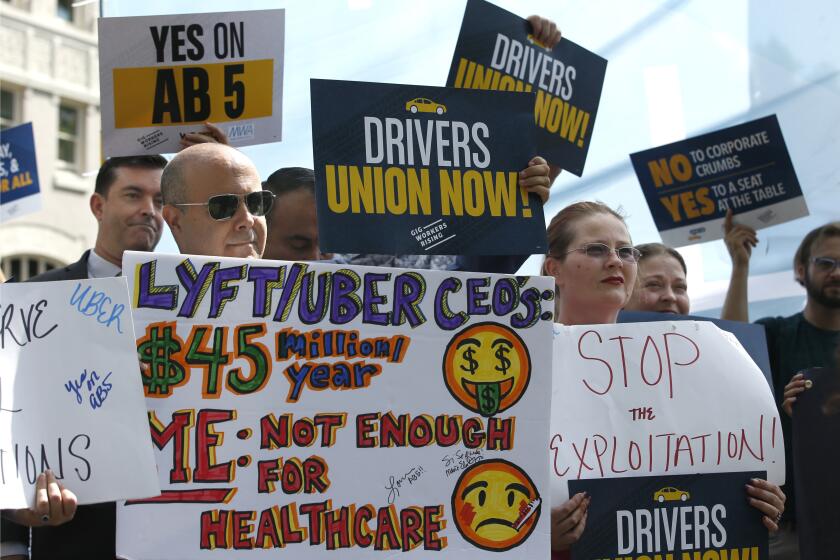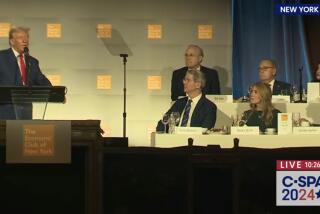Google, Facebook offer paid leave to parents amid coronavirus school closures
- Share via
California public schools are likely to be closed for the rest of the school year. Daycare centers and childcare providers are scrambling to keep up under fears of coronavirus contagion and the difficulties of operating during lockdown.
Millions of parents are stuck juggling the twin demands of working a full schedule from home while keeping stir-crazy kids occupied, day after day. But for the ones who work at Facebook and Google, a measure of relief has arrived.
For the record:
10:33 p.m. March 31, 2020This story was updated to correctly describe Michael DeAngelo’s past position at Google, where he served as a regional head of people, not chief people officer, and to clarify the nature of Facebook’s performance rating system.
Long known for leading corporate America in employee benefits, the two Silicon Valley giants are offering large blocks of emergency leave to parents struggling to deal with disruptions to their family schedules.
At Google, employees taking care of children or family members are being offered two weeks off without dipping into their paid leave following the closure of any school or care facility. After using that, those who still need to work fewer hours or days have the option to take an additional four weeks of paid leave.
Here’s who qualifies for paid sick leave, and who doesn’t, under the new federal emergency coronavirus relief package.
Facebook is similarly offering four weeks to employees who are facing unexpected caregiving needs, and an additional six weeks of emergency care leave for employees who need to take time to take care of any family members who fall ill or are dealing with other medical conditions.
Facebook and Google have some of the largest cash reserves of any companies in the world, which allows them to offer generous benefits even as their revenues suffer from decreased advertising spending. But the perks at the biggest tech companies have a tendency to ripple out across the entire industry thanks to the stiff competition for talent, according to Michael DeAngelo, who has served as a regional head of people (head of human resources) at Google, and chief people officer at Pinterest and Mozilla.
“It’s an arms race in tech to hire people, which leads to this constant competition of companies one-upping each other,” DeAngelo said. “A lot of smaller companies try to compete there, and to a large extent they can, but it’s harder without unlimited money in the bank.”
Facebook is also disbursing a $1,000 bonus to all 45,000 employees and declaring that all will automatically get an “exceeds expectations” rating on their biannual performance reviews, a distinction that confers additional bonus pay under the company’s standard compensation plan.
Having kids at home during the coronavirus pandemic is a challenge for parents. Here are some resources to help get you through the day.
DeAngelo noted that many smaller companies across the tech industry are doing what they can for their staff, offering more flexible schedules and guaranteeing bonuses when possible.
The new Facebook and Google benefits do not apply to contractors, who make up a large percentage of their workforces: At Google, the roughly 102,000 full-time employees are outnumbered by approximately 121,000 temps and contractors, according to reporting by the New York Times.
But tech companies have taken other measures to support those workers. After a delay, both Facebook and Google began allowing contractors to work remotely, and they along with Microsoft, Twitter and Amazon have committed to pay hourly support staff their regular wages even if their working hours decrease as offices close. Google has also said that it is establishing a fund to cover paid sick leave for all of its temp and contract workers.
Eleven U.S. states, including California, have paid sick or family leave laws on the books, and the federal government passed a law on March 18, the Families First Coronavirus Response Act, that extended paid leave even further starting April 1. The federal measure mandates that employees under quarantine or with COVID-19 symptoms must receive two weeks or up to 80 hours of paid sick leave at their full wage, and allows employees with children at home to take an additional 10 weeks of paid family leave at two-thirds of their normal wage.
The coronavirus outbreak, and the economic downturn it has ushered in, have given fresh arguments to both sides in the fight over the legal rights of independent contractors.
But the new rules don’t apply to everyone. The requirements only apply to public sector workers and private employers with fewer than 500 employees. Small businesses with fewer than 50 employees can also apply for an exemption. According to federal labor statistics, more than 47% of U.S. workers — more than 60 million people — work for large employers that are exempt, and another 27% of working Americans are employed by small businesses.
State Sen. Ling Ling Chang (R-Diamond Bar) introduced a bill in Sacramento Monday that would go beyond the federal measures and give paid leave to all parents affected by coronavirus-related school closures, but for now large California companies are free to devise individual responses.








